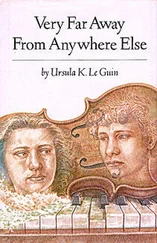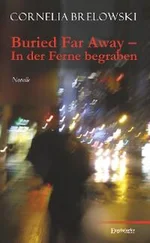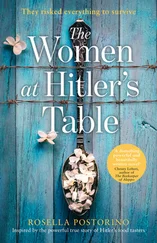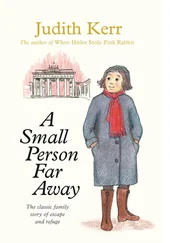One Thursday afternoon a few weeks after Anna had started school she and Mama went to visit Great-Aunt Sarah. Great-Aunt Sarah was Omama’s sister but had married a Frenchman, now deceased, and had lived in Paris for thirty years. Mama, who had not seen her since she was a little girl, put on her best clothes for the occasion. She looked very young and pretty in her good coat and her blue hat with the veil, and as they walked towards the Avenue Foch where Great-Aunt Sarah lived, several people turned round to look at her.
Anna had put on her best clothes too. She was wearing the sweater Mama had knitted, her new shoes and socks, and Onkel Julius’s bracelet, but her skirt and coat were horribly short. Mama sighed, as always, at the sight of Anna in her outdoor things.
“I’ll have to ask Madame Fernand to do something with your coat,” she said. “If you grow any more it won’t even cover your pants.”
“What could Madame Fernand do?” asked Anna.
“I don’t know – stitch a bit of material round the hem or something,” said Mama. “I wish I knew how to do these things, like her!”
Mama and Papa had been to dinner with the Fernands the previous week and Mama had come back bursting with admiration. In addition to being a wonderful cook Madame Fernand made all her own and her daughter’s clothes. She had re-upholstered a sofa and made her husband a beautiful dressing-gown. She had even made him some pyjamas when he could not find the colour he wanted in the shops.
“And she does it all so easily,” said Mama, for whom sewing on a button was a major undertaking – “as though it weren’t work at all.”
Madame Fernand had offered to help with Anna’s clothes, too, but Mama had felt perhaps that would be too much to accept. Now, however, seeing Anna stick out of her coat in all directions, she changed her mind.
“I will ask her,” she said. “If she just showed me how to do it perhaps I could manage it myself.”
By this time they had arrived at their destination. Great-Aunt Sarah lived in a large house set back from the road. They had to cross a courtyard planted with trees to reach it and the concierge who directed them to her flat wore a uniform with gold buttons and braid. Great-Aunt Sarah’s lift was made of plate glass and carried them swiftly upwards without any of the groans and shudders Anna was used to, and her front door was opened by a maid in a frilly white apron and cap.
“I’ll tell Madame you’re here,” said the maid, and Mama sat on a little velvet chair while the maid went into what must be the drawing room. As she opened the door they could hear a buzz of voices and Mama looked worried and said, “I hope this is the right day …” But almost at once the door opened again and Great-Aunt Sarah ran out. She was a stout old lady but she moved at a brisk trot and for a moment Anna wondered whether she would be able to stop when she reached them.
“Nu,” she cried, throwing her heavy arms round Mama. “So here you are at last! Such a long time I haven’t seen you – and such dreadful things happening in Germany. Still, you’re safe and well and that’s all that matters.” She relapsed into another velvet chair, overflowing on all sides, and said to Anna, “Do you know that the last time I saw your Mama she was only a little girl? And now she has a little girl of her own. What’s your name?”
“Anna,” said Anna.
“Hannah – how nice. A good Jewish name,” said Great-Aunt Sarah.
“No, Anna,” said Anna.
“Oh, Anna. That’s a nice name too. You must excuse me,” said Great-Aunt Sarah, leaning perilously towards her on the little chair, “but I’m a bit deaf.” Her eyes took in Anna properly for the first time and she looked astonished. “Goodness, child,” she exclaimed. “Such long legs you have! Aren’t they cold?”
“No,” said Anna. “But Mama says if I grow any more my coat won’t even cover my pants.”
As soon as the words were out of her mouth, she wished she had not said them. It was not the sort of thing one said to a great-aunt one hardly knew.
“What?” said Great-Aunt Sarah.
Anna could feel herself blushing.
“A moment,” said Great-Aunt Sarah and suddenly from somewhere about her person, she produced an object like a trumpet. “There,” she said, putting the thin end not to her mouth as Anna had half-expected, but to her ear. “Now say it again, child – very loudly – into my trumpet.”
Anna tried desperately to think of something quite different that she could say instead and that would still make sense, but her mind remained blank. There was nothing for it.
“Mama says,” she shouted into the ear-trumpet, “that if I grow any more my coat won’t even cover my pants!”
When she withdrew her face she could feel that she had gone scarlet.
Great-Aunt Sarah seemed taken aback for a moment. Then her face crumpled up and a noise somewhere between a wheeze and a chuckle escaped from it.
“Quite right!” she cried, her black eyes dancing. “Your mama is quite right! But what is she going to do about it, eh?” Then she added to Mama, “Such a funny child – such a nice funny child you have!” And rising from the chair with surprising agility she said, “So now you must come and have some tea. There are some old ladies here who have been playing bridge, but I’ll soon get rid of them” – and she led the way, at a gentle gallop, into the drawing room.
The first thing that struck Anna about Great-Aunt Sarah’s old ladies was that they all looked a good deal younger than Great-Aunt Sarah. There were about a dozen of them, all elegantly dressed with elaborate hats. They had finished playing bridge – Anna could see the card tables pushed back against the wall – and were now drinking tea and helping themselves to tiny biscuits which the maid was handing round on a silver tray.
“Every Thursday they come,” whispered Great-Aunt Sarah in German. “Poor old things, they have nothing better to do. But they’re all very rich and they give me money for my needy children.”
Anna, who had only just got over her surprise at Great-Aunt Sarah’s old ladies, found it even more difficult to imagine her with needy children – or indeed with any children at all – but she did not have time to ponder the problem for she was being loudly introduced along with Mama.
“My niece and her daughter have come from Germany,” shouted Great-Aunt Sarah in French but with a strong German accent. “Say bongshour!” she whispered to Anna.
“ Bonjour ,” said Anna.
Great-Aunt Sarah threw up her hands in admiration. “Listen to the child!” she cried. “Only a few weeks she has been in Paris and already she speaks French better than I!”
Anna found it difficult to keep up this impression when one of the ladies tried to engage her in conversation, but she was saved from further efforts when Great-Aunt Sarah’s voice boomed out again.
“I have not seen my niece for years,” she shouted, “and I have been longing to have a talk with her.”
At this the ladies hurriedly drank up their tea and began to make their farewells. As they shook hands with Great-Aunt Sarah they dropped some money into a box which she held out to them, and she thanked them. Anna wondered just how many needy children Great-Aunt Sarah had got. Then the maid escorted the ladies to the door and at last they had all disappeared.
It was nice and quiet without them, but Anna noticed with regret that the silver tray with the little biscuits had disappeared along with the ladies and that the maid was gathering up the empty cups and carrying them out of the room. Great-Aunt Sarah must have forgotten her promise of tea. She was sitting on the sofa with Mama and telling her about her needy children. It turned out that they were not her own after all but a charity for which she was collecting money, and Anna who had briefly pictured Great-Aunt Sarah with a secret string of ragged urchins felt somehow cheated. She wriggled restlessly in her chair, and Great-Aunt Sarah must have noticed for she suddenly interrupted herself.
Читать дальше












